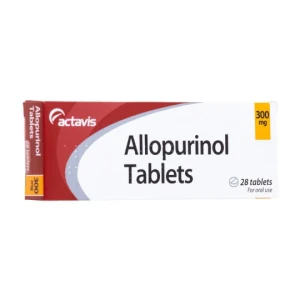Allopurinol
Prices from £14.99
Review More Prices
- Click on the green "Back To Get Started" button, then click "Start Consultation" button on the next page.
- Fill in our short consultation form.
- Choose delivery method and mode of payment.
- Our team of expert prescribers will assess whether medication is suitable.
- If you get the green light and it is deemed suitable, your order will be processed quickly and efficiently.
Your privacy is important, Prescription Doctor are committed to keeping your details completely confidential.
This is why we also take steps to conceal your prescription products under two layers of packaging.
We have a commitment to delivering a discreet service and understand your need for privacy. We ship all orders via a trackable courier using discreet, plain packaging.
Once your order is dispatched you will receive a tracking number via sms and email.
We deliver medications between Monday and Saturday. You can upgrade to Saturday delivery on Friday.
You should receive a tracking number with your order which you can use this number to track your parcel online. This should give you a clear indication of where your parcel is. If you haven’t received your parcel in the time frame given by our couriers, contact your local depot to find out where it is. You can also contact our support team who will do this for you.
On checkout you will be asked to leave your mobile number so our courier can text you about the delivery. This is also useful if the courier has problems finding your address. We will not use your mobile number for anything else.
You can pay for your order using credit, debit card or via bank transfer.
If you don’t have a credit or debit card you can pay via bank transfer. We will give you a unique reference number at checkout along with details of how to make the transfer. Once the money has cleared in our account, we will process your order.
We are a completely secure site and take many measures to ensure your details are kept safe. We understand that you have a right to extreme privacy when purchasing sensitive health medications. All information that you provide to us is stored on our secure servers. Any payment transactions will be encrypted using SSL technology.
You can pay for your order using credit, debit card and bank transfer.
Card Payment: Please notify us that you wish to cancel your order. Your refund will show available In 1 - 3 days.
Bank Transfer: A member of our team will contact you requesting for your bank details. These details are only used to transfer the funds back into your account.
Table of contents
What Is Allopurinol?
Allopurinol was discovered in the early 1950s by Dr Gertrude Elion and Dr George Hitchings, and their pioneering work on this and other medications that work on improving the metabolism eventually earned them a Nobel Prize.
Fast forward to today, and Allopurinol is an invaluable treatment for gout that many thousands of people use to great effect every day.
What Is Allopurinol Used For?
Allopurinol, known under the brand name of Allopurinol BP 100mg, is usually used to relieve the symptoms of gout, which is a form of arthritis that’s caused by the crystallisation of uric acid in the joints.
How Does Allopurinol Work?
Allopurinol works so well against gout because it prevents the formation of uric acid, which is the compound responsible for the painful gout attacks. Allopurinol blocks the enzyme xanthine oxidase, which plays an important role in uric acid production, and this means that uric acid crystals can’t accumulate in the joints.
How Does Allopurinol Treat Gout?
Allopurinol doesn’t just stop the symptoms of gout, but it also reduces the likelihood of recurring attacks. By reducing the uric acid levels in the body, inflammation in the joints subsides, which leads to reduced pain and swelling.
Plus, allopurinol works as a prophylactic, preventing the formation of new uric acid crystals and minimising the risk of future gout flare-ups.
How Long Does Allopurinol Take To Work?
When taking Allopurinol, patience is important as it can take a number of weeks or even months to fully work.
The timeframe will vary from person to person because of a range of different factors including how severe the gout is, the patient’s overall health, and how they adhere to their prescriptions. Although improvement might be gradual, for those suffering from the pain of gout, the wait is certainly worth it when relief comes.
Allopurinol Dosage Directions?
When it comes to Allopurinol, it’s crucial to remember that one size (of dosage) doesn’t fit all, and the recommended dosage will depend on the severity of the condition, with Allopurinol 100mg being a good starting point.
Regular monitoring by healthcare professionals is crucial, as dosages might need to be adjusted over time – it will often depend on individual responses and any potential side effects.
Overdosing can have serious consequences, so making sure you stick to the doctor’s recommended dosage is vital.
How To Take Allopurinol
The way to take Allopurinol for adults in tablet form are the most common, and these pills should ideally be taken with food. Timing isn’t strict, but consistency is absolutely vital.
It’s also crucial to avoid alcohol – which can actually make gout worse – and certain medications can interact negatively with Allopurinol, so speaking to your doctor first is necessary.
Who Should Not Take Allopurinol?
If you are of Han Chinese, African or Indian origin, it’s vital to get further advice about taking Allopurinol, as it might not be effective for you.
Plus, people with specific medical conditions, like severe liver disease, may need to avoid Allopurinol and, again, speaking to your doctor to find out is important.
It's vital not to self-medicate even if you’re sure that Allopurinol will help you. There are important factors to take into account, meaning that a doctor’s care is necessary.
If you feel that Allopurinol might be a useful medication to help you deal with the symptoms of gout, it’s important to make an appointment with your healthcare provider to discuss your options. They will be able to tailor a treatment plan that works for you, depending on your specific needs.
At PrescriptionDoctor, we can be your help against gout. Our expert consultation services, support, and convenient delivery services guarantee you’ll always have precisely what you need when it comes to medication.
Frequently Asked Questions (FAQs) About Allopurinol
What Should I Know Before Taking Allopurinol?
Do not take Allopurinol if you are allergic to it or any of its ingredients. Caution is needed if you have liver or kidney problems, heart problems, high blood pressure, or are currently having a gout attack. It's also important to discuss with your healthcare provider if you are of Han Chinese, African, or Indian origin or if you have thyroid problems.
How Should I Take Allopurinol?
Take Allopurinol tablets exactly as prescribed by your doctor. They should be taken orally after food with a glass of water. Dosage adjustments may be necessary based on individual factors like age and kidney function. The usual adult dose ranges from 100 to 900 mg per day.
What Are the Possible Side Effects of Allopurinol?
Possible side effects include blood disorders, symptoms of diabetes, hyperlipidemia, depression, headache, dizziness, drowsiness, vision disturbances, muscular weakness, cataracts, chest pain, high blood pressure, skin reactions, nausea, vomiting, liver function changes, and serious allergic reactions. Not everyone experiences these side effects.
Can I Take Allopurinol During Pregnancy and Breastfeeding?
Consult your doctor for advice before taking Allopurinol if you are pregnant, breastfeeding, or planning to have a baby. Allopurinol is excreted in human breast milk and is not recommended during breastfeeding.
Can Allopurinol Affect My Ability to Drive or Use Machines?
Allopurinol may cause drowsiness, affect coordination, and vision, or cause dizziness. If you experience these symptoms, avoid driving or operating machinery.
What Should I Do If I Take More Allopurinol Than I Should?
If you take more Allopurinol than prescribed, contact your doctor or nearest hospital emergency department immediately. Signs of an overdose may include nausea, vomiting, diarrhoea, and dizziness.
Sources
NHS, 2023. Allopurinol: NHS Medicine Guide.
EMC, 2023. Allopurinol: EMC Patient Information Leaflet.
NHS, 2023. Gout: NHS Condition Guide.
NHS, 2023. About Allopurinol: NHS Medicine Guide.
NICE CKS, 2023. Gout - Prescribing Information: Allopurinol.
Treatment information
- Product Name:
- Manufacturer:
- Active Ingredient(s):
- Administration:
- Presentation:
- Available Strength:
- Exemption:
- Dosage:
- Description:
- Drug Class:
- Alcohol Consumption:
- When Pregnant:
- Price: GBP
Authored By

Lisamarie Lamb
Medical Content WriterPublished on: 07/11/2023
Reviewed By

Dr Giuseppe Aragona
DoctorReviewed on: 13/03/2024
© 2013 - 2025 Al Muhsineen Limited. All Rights Reserved. Registered Pharmacy: 34 Halliwell Road, Bolton BL1 8RL. Registered Office: 254 First Floor, Shearbrow, Blackburn, England, BB1 8DS







